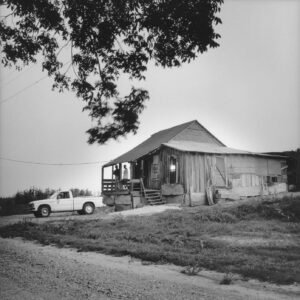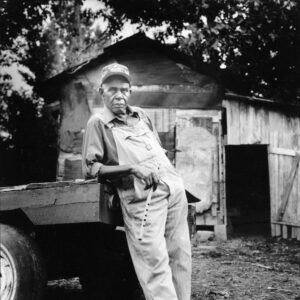Bill Steber
- 1998

Fellowship Title:
- Blues Culture in Mississippi
Fellowship Year:
- 1998

Good Times Fall On Hard Times In Mississippi
“I believe I’ll get drunk, tear this barrel house down.” —Drunken Barrel House Blues, Memphis Minnie. The juke joints are dying. “We used to have big crowds, every Friday night especially, and check nights,” said James Alford, manager of Smitty’s Red Top Lounge in Clarksdale, Miss. Live–at a Mississippi Juke Joint – Po’ Monkey’s place, located amid cotton fields two miles down a dirt road outside Merigold, MS, is perhaps one of the last old-style country jukes in the Delta. It’s been operated by tractor driver Willie “Po’ Monkey” Seeberry for more than 30 years in a turn-of-the-century sharecropper’s shack where Seeberry lives. The juke packs in customers every Thursday night to dance, drink beer, and eat fish, ribs and pork chop sandwiches prepared by his ex-sister-in-law, Irene Johnson. Just as in the boom days of the Delta, the shack is owned by Seeberry’s white employer who allows him to run the club out of his home for extra money and to provide a social outlet for locals. Po’ Monkeys Lounge draws in whites and

African-American Music from the Mississippi Hill Country: “They Say Drums was a-Calling”
On a small, nondescript farm in rural northeast Mississippi, between the towns of Senatobia and Como, is one of America’s last and most tangible links to its African musical past. African Fife and drum music was historically at the center of black musical and social culture in North East Mississippi hill country and other Southern communities dating back to the birth of the nation. But with the passing of time and traditions, master fife player Otha Turner, at age 92, now heads the last African fife and drum band in Mississippi. Turner is teaching the music to his grandchildren in the hopes that future generations will preserve one of the oldest known forms of African-American folk music. It’s here, at country picnics in the community of Gravel Springs, that 92-year-old Otha Turner still performs on the homemade cane fife as younger family members beat out African-based rhythms on drums, and members of the local community gather to dance, drink corn whiskey, and eat goat sandwiches just as they have for well over a century. Otha
